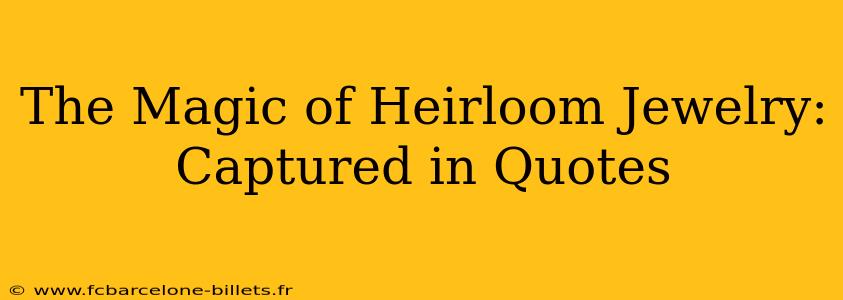Heirloom jewelry. The very phrase evokes images of shimmering diamonds, intricately carved gold, and the whispers of generations past. More than mere adornment, these pieces are tangible links to our history, carrying with them stories, memories, and a timeless elegance that transcends fleeting trends. This isn't just about the monetary value; it's about the emotional resonance, the legacy passed down, and the magic imbued within each carefully crafted piece. Let's explore this magic, capturing its essence through insightful quotes and exploring the often-asked questions surrounding heirloom jewelry.
What Makes Heirloom Jewelry So Special?
Heirloom jewelry possesses a unique allure that surpasses contemporary designs. It's not just about the precious metals and gemstones; it's the narrative embedded within each piece. The sentimentality, the stories of those who wore it before, the memories associated with specific moments – these are the intangible elements that elevate heirloom jewelry to something truly special. As the saying goes, "It's not about what you wear, but what it means." This perfectly encapsulates the heart of heirloom jewelry. It's a tangible representation of family history, a silent storyteller whispering tales of love, loss, triumph, and resilience.
How Do I Care for Heirloom Jewelry?
Proper care is crucial for preserving the beauty and integrity of your heirloom pieces. "An ounce of prevention is worth a pound of cure" applies perfectly here. Regular cleaning, careful storage, and periodic professional inspections are essential. Avoid wearing your heirlooms during strenuous activities, and always ensure they are properly insured. Consider investing in a dedicated jewelry box with soft compartments to prevent scratches and tarnish. A soft cloth and gentle cleaning solution can help maintain their shine. Remember, "The best way to keep something beautiful is to cherish it."
What is the Best Way to Clean Heirloom Jewelry?
Cleaning heirloom jewelry requires a delicate touch. Avoid harsh chemicals and abrasive cleaners. A mild solution of warm water and gentle soap, followed by a thorough rinse and careful drying with a soft cloth, is usually sufficient. For more intricate pieces or those with delicate settings, consider seeking professional cleaning services. Remember, "Prevention is better than cure," so storing your jewelry properly is just as important as cleaning it.
What are Some Common Problems with Heirloom Jewelry?
Over time, heirloom jewelry can suffer from various issues, including damage to settings, loose stones, scratches, and tarnish. "Time takes its toll," and this is particularly true for delicate jewelry. Regular inspections by a professional jeweler can help identify potential problems early on. This proactive approach allows for timely repairs and helps preserve the integrity of the piece.
How Can I Identify the Age and Value of My Heirloom Jewelry?
Determining the age and value of heirloom jewelry can be a fascinating journey. Researching hallmarks, maker's marks, and stylistic features can provide valuable clues. Consult with reputable appraisers or antique jewelry specialists for professional assessment. They can provide expert insight into the piece's history, authenticity, and monetary value. Remember, "Knowledge is power," especially when it comes to understanding and appreciating the legacy of your heirloom jewelry.
How Can I Appraise Heirloom Jewelry?
Appraising heirloom jewelry involves more than just determining its monetary worth; it's also about understanding its historical significance and sentimental value. Finding a reputable appraiser specializing in antique and heirloom jewelry is key. They'll consider factors such as the materials used, craftsmanship, age, condition, and any unique features to provide a comprehensive evaluation. "A fair price reflects both value and history" – this should guide your search for a qualified appraiser.
What are the ethical considerations of selling heirloom jewelry?
Selling heirloom jewelry can be a complex decision with ethical implications. Open communication within the family is crucial, particularly when multiple family members have an emotional attachment to the piece. Transparency and mutual respect are essential to navigate potential disagreements. It's also important to ensure that the sale process is fair and ethical, including seeking professional appraisals and understanding market values.
Conclusion: The Enduring Legacy
Heirloom jewelry is more than just a collection of precious metals and gemstones; it's a living testament to the enduring bonds of family and the passage of time. Each piece holds a unique story, a silent narrative whispering tales of generations past. By understanding its history, properly caring for it, and appreciating its sentimental value, we can ensure that the magic of heirloom jewelry continues to shine brightly for generations to come. "The legacy of heirloom jewelry is not just about the pieces themselves; it is about the love and memories they carry."

